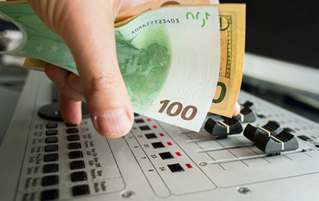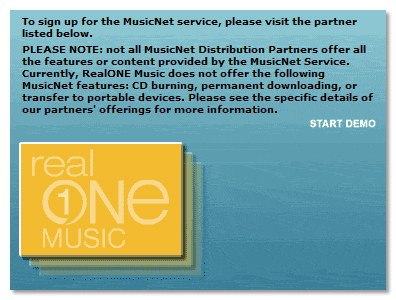5 Things Record Labels Don't Want You to Know They Do

You've read so much about the music industry and its upstanding business practices that you likely think there isn't anything else we could tell you that would come as a surprise. But some record label tactics are so covert that it takes a fair amount of digging just to find out they exist. Here are a few things record labels don't want you to know that they still do in an effort to separate you -- and the artists -- from your hard-earned cash. Things like ...
Demanding Payment Virtually Any Time Music Is Played in Public

Obviously, if you want to use somebody's music for commercial purposes, like in your movie or TV ad, you have to pay. So, you have to license it from a group like ASCAP, BMI, or SESAC, which makes sure record labels and artists collect the royalties they're owed for this sort of thing. Makes sense, right? Well, hang on, because it's about to get stupid.
It probably won't surprise you to know that things like charging a crowd of people $2 each to listen to a band's CD is illegal -- you're basically getting paid for a performance of somebody else's music that you don't own the rights to. But the definition of the word "performance" is mind-bogglingly vast when it comes to music royalties.

"That'll be six bucks."
For example, did you know that a "public performance" includes a coffee shop owner putting a CD or an MP3 player behind the counter to play some Mumford & Sons as background music? Or that it counts as a performance if a shop wants to play music over the phone while people are on hold? That's why hold music is almost always bland, instrumental filler -- keeping you on hold to a computer algorithm's idea of a "marimba jam" is a lot less expensive than having Usher keep your hold time sexy. ASCAP explains it all in this depressingly comprehensive guide to all the ways you can pay for the right to listen to the music you already own when other people who don't also own it might be close enough to hear it too.
They even take time out to lecture you for not considering the artist, who might be getting shafted out of their four-tenths of a cent royalty when you choose to dance to "Wonderful Tonight" at your wedding reception without asking Clapton first:

"This rule, however, does not apply to us."
Oh, and they also argued that royalties should be collected on ringtones. Not on the purchase of ringtones, mind you; they already have that. Rather, they wanted to be paid every time the phone rings. In other words, when a phone rings in a crowded movie theater, someone out there believes you've just been entertained to such a degree that an additional outlay of cash is warranted.
Their attempts to cash in every time a song is even thought about being listened to haven't always been successful, though. They wanted to collect on those 30-second samples you listen to before actually purchasing a song, which is kind of like the government taxing the free pizza samples you eat at the grocery store as income. Or maybe it's nothing like that ... we're not record executives. We can assure you it's just as stupid, though.

"Keep shopping! It costs $70 to get in here, we're going to stock up!"
Reducing Sound Quality So You Perceive a Song as "Louder"

Due to the way the human brain works, there is a formula for making a song into a hit (we broke down the numbers here), and one of the most important elements for the last few decades has been "loudness." But wait a second -- how can record companies determine how "loud" a song is when we're the ones with our hands on the volume knob?
It has to do with how the track is engineered. The trend started as far back as the days of jukeboxes, when producers noted that certain tracks got better reactions than others, and a lot of it came down to how loud the song was perceived to be when it started playing. Over the years, through science that produces screenshots like this ...

Oh, man, we haven't heard that song in ages!
... it was discovered that you could use a technique called dynamic range compression to amplify the quieter parts of the melody to match the louder tracks like drums and bass. The difference is demonstrated masterfully here:
The result is a song that has a more "in your face" quality at first listen. And that's exactly what record labels want: a song that grabs your attention right away. So what's the problem?
Well, it's sort of ruining the music. See, there used to be limits to how horribly you could mangle the dynamics of a song when analog equipment was the only way to record. But digital technology did away with that shit, and now record labels are free to blast your eardrums with all the unnecessary noise they think you can handle. In many cases, classic albums from the analog days were taken back into the studio, ruined, and then marketed as "digitally remastered."

Because if there's one thing Depeche Mode needed in order to be a good band, it was loudness.
That's how we found ourselves staring down the business end of the Loudness War, the music industry's attempt to address the growing prevalence of shitty ear bud headphones turning every song up to 11.
And the thing is, most of you didn't even know this was happening until now -- it's hard to perceive what's wrong until you hear the unaltered version. This happened with Metallica's album Death Magnetic. On the same day the album was released to retail outlets, it was also made available as a playable download in the video game Guitar Hero. It didn't take especially attentive fans long to notice that the non-game album sounds like complete ass when compared to the Guitar Hero version. Why? Because the latter hadn't had its levels pegged to eliminate all range:

Because if there's one thing Metallica needed help with, it was loudness.
Fans started an online petition to force the band to remaster the album, and Lars Ulrich responded exactly in the manner you'd expect the guy who destroyed Napster to reply.
The worst part about all of this is that it's more than just a matter of taste. Your booty may crave the beat, but your brain and ears need dynamics and sound diversity to keep engaged. Without them, one succumbs to ear fatigue, and there's even danger of actual hearing loss. There hasn't been a Metallica album worth that kind of risk since the mid-'80s.

Know what? Let's just let Metallica have this one.
Straight Up Paying to Get Their Song on the Radio

Hey, do you remember when, for a brief period of time, Limp Bizkit was the biggest band in the world? Ever wonder how that whole thing happened?
You may have heard of payola before -- it's the shady practice of paying radio station programmers and disc jockeys cash under the table to include a specific song or group of songs in their rotation. It was outlawed at one point, but that doesn't mean it went away. They call it pay-for-play now, and record labels get around the illegal part by being totally up front when a cash exchange takes place. That's how we wound up with Limp Bizkit, and we're not being sarcastic -- it was literally a pay-for-play scheme that helped propel Limp Bizkit from terrible rap-rock band to terrible rap-rock band that we heard all the time for a few years there in the early 2000s.

"Sing along, y'all! Doesn't matter what, just make some shit up."
In a perfectly legal deal between Flip/Interscope Records and Portland, Oregon's KUFO-FM, Limp Bizkit's early single "Counterfeit" (which is presumably about Fred Durst's degree from rap college) was played 50 times on the station over the span of five weeks in exchange for $5,000 from the label. They were able to get away with this skirting of payola laws by simply adding a blurb that said "Brought to you by Flip/Interscope" at the beginning of the song.
And now, get ready for the douchiest quote you'll read for at least a few more sentences:
"Pay-for-play is the idea that all of the subtle quid pro quo that was going on in the past bubbles to the surface and becomes a line item in people's budgets."

"Wait, why am I doing this, again? I don't even own a CD player."
Translation: Fuck you, it's legal now because we said it's legal. That's a quote from Tom Barnes, the man who helped broker the shady radio arrangement. His efforts cleared the way for Limp Bizkit to play a well-attended show in one of the biggest hipster strongholds in all the land. Radio station interest in the band took off from there. Fast forward to right now and Chocolate Starfish and the Hot Dog Flavored Water is something you wish you hadn't just been reminded of.
Manipulating the Charts to Make a Song Look Like a Hit

Believe it or not, the Hot 100 part of Billboard charts used to be compiled by calling up record stores and asking them how many of each album they sold. Needless to say, fuckery abounded, and 1991 saw tracks in the Hot 100 (Paula Abdul's "The Promise of a New Day" and Roxette's "Fading Like a Flower") that held much higher places than their Nielsen-monitored sales and airplay figures would justify. To try to clean up such blatant bullshit, a point-of-sale tracking system called SoundScan was implemented. But time and time again, even SoundScan has been thwarted using sometimes shockingly low-tech techniques like having clerks scan sales more than once.

"Can you please tell him to stop? I've been here for 35 minutes."
See, there are actually sleazy consultants that work with labels to figure out ways to alter sales figures and get the free publicity that comes with placing high on the charts -- giving out free and discount copies, focusing on independent stores that weigh more heavily in the system, and even switching bar codes on products. It's been claimed that such techniques can nudge a single as many as 10 spots on the Billboard chart, which could be just the boost a track needs to hit the top 10.
One classic technique that's used to make album sales seem more impressive than they are is to put out a double or sometimes even a triple album and price it like a single disc. Why? Well, for RIAA certification and record sales purposes, double albums count as two sales, no matter the price. This exact ploy was used on country sensation Shania Twain's fourth studio album, Up! It was released as a two-CD set featuring the exact same album presented in a "pop" version and a "country" version -- and every time somebody buys it, it counts as two copies sold. Now it's twice as easy to get the free publicity and accolades that come with going "platinum."

"And I'd also like to thank my criminally dirty record label. Without their moral corruption, none of this would be possible."
No artist has mastered the art of inflating sales numbers quite like Prince, though. For his 2004 Musicology album, the diminutive singer announced that he was going on tour to "play the hits" one last time and then, brilliantly, included a copy of his new album with the ticket price. Fans came out in droves at the promise of hearing Prince play the songs he's famous for (something he's been reluctant to do on several occasions), and every one of them was handed a copy of his album when they arrived at the show. Every one of those albums counted toward his Billboard and SoundScan totals. Of course, new rules were immediately put in place to prevent other artists from exploiting this tactic in the future.
Undeterred, Prince kept the experimental distribution tactics around for his next album, Planet Earth, which he gave away for free in a London newspaper.

Shit, he's wearing his "go fuck yourself" outfit.
Though maybe it's hard to blame the guy for trying, considering the labels' reputation for ...
Inflating Prices, Then Screwing the Artists

If you remember the ancient era when buying CDs was the only way to get your favorite songs, you remember how overpriced they were. This isn't just opinion -- there was a class action lawsuit that charged the music industry with illegal price fixing and ended with a payout to consumers to the tune of $67.4 million in cash and $75.7 million in free CDs, all of which probably sucked. This is why people started desperately downloading tracks that would take an hour over a 56K dial-up connection.
You would suspect that the situation would have just righted itself as downloadable files began to overtake physical discs as the medium of choice, but surprisingly, things only got worse once that change happened. This time, the various record labels conspired to set an artificial price floor for downloads. Fortunately, these were pre-iTunes problems that only happened with dinosaur music services like Pressplay and MusicNet, which would have both been just as useful not existing at all.

"Please note: Each song will be accompanied by a five-minute commercial. Each play constitutes a new purchase."
But that has forced labels to get creative. For instance, in the wake of the untimely death of pop legend Whitney Houston, fans noticed that less than 30 minutes after news of the singer's death broke, her album prices skyrocketed on iTunes and Amazon. The price for her 2007 album The Ultimate Collection, for example, jumped from $4.74 to $12.62 in mere hours.
But isn't this sort of fuckery all so that greedy rock stars can live the rock star lifestyle? These are people who spend their downtime having snowball fights with bikini models, where the snowballs are made out of cocaine.
Nope -- for the most part, the artist doesn't make shit from record sales. Not only can the label wind up keeping all of the profits on even an album that goes platinum, but the band can actually wind up deeply in debt to the label. For instance, after selling over 2 million records and receiving precisely dick, the band 30 Seconds to Mars still owed EMI over $1 million.

And that was just their sunglasses budget.
How is that even possible? Easy -- the label makes the musician cover the cost of everything from recording the album, to promotion, to shooting the videos. It all counts against their cut of the record sales.
Courtney Love, of all people, walks us through how it works: Young artists find out they're getting a million-dollar advance from the label and think they've won the lottery. Then they find out that recording the album, promoting it, shooting the video, and other costs wipe out the advance, and then some.

And then they're contractually obligated to become a terrible heroin-addicted leech on society.
So, their debut album can go double platinum and they'll still be in the red, having to pay back the label with their cut of the record sales ... which is almost impossible, because the artist's cut is tiny. Lyle Lovett, after selling over 4 million albums during the course of his career, says he has not seen one goddamn cent. So if you want to build a cocaine snowman, don't start a band -- go work for the label. There's probably not as many groupies, though.
Dwayne interviews touring bands for REVUE West Michigan magazine and reports on the local scene for Kalamazoo Local Music. You can find Rani on Twitter and on Tumblr.
For more secrets industries want to keep you blind to, check out 5 Ways Hollywood Tricks You Into Seeing Bad Movies and 5 Creepy Ways Video Games Are Trying to Get You Addicted.
If you're pressed for time and just looking for a quick fix, then check out 5 Grimms' Fairy Tales Way Too Dark to Read to Kids.
And stop by LinkSTORM to learn the dark secret of Carly Rae Jepsen's body parts. (Hint: They aren't hers.)
Do you have an idea in mind that would make a great article? Then sign up RIGHT NOW and pitch your first article today! Do you possess expert skills in image creation and manipulation? Mediocre? Even rudimentary? Are you frightened by MS Paint and simply have a funny idea? You can create an infographic and you could be on the front page of Cracked.com tomorrow!
And don't forget to follow us on Facebook, Twitter, and Tumblr to get sexy, sexy jokes sent straight to your news feed. Are you on Google+? So are we!